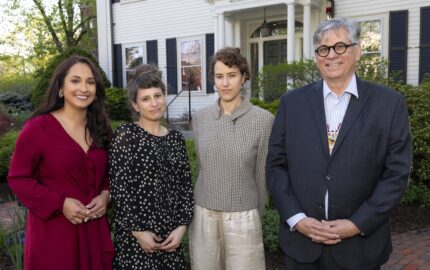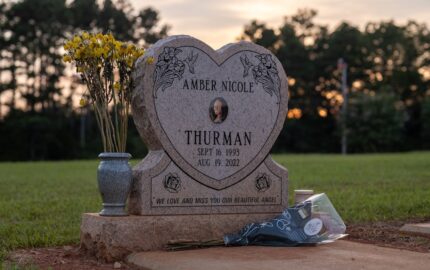Watch videos from the event »CAMBRIDGE, Mass. – C. J. Chivers, senior writer for The New York Times, will deliver the 32nd Joe Alex Morris Jr. Memorial Lecture at the Nieman Foundation for Journalism at Harvard on Nov. 29, 2012. The annual Morris Lecture honors an American overseas correspondent or commentator on foreign affairs who is invited to Harvard to speak about international reporting.
At The Times, Chivers covers conflict, crime, the arms trade and human rights for the foreign and investigative desks and contributes to the “At War” and “Lens” blogs. He is a frequent contributor to Esquire and writes occasionally for other publications.
His book “The Gun,” a history of automatic arms and their influence on human security and war, was selected as a New York Times Editor’s Pick and a Best Book of 2010 by The Atlantic and The Washington Post.
From 1988 until 1994, Chivers was an infantry officer in the United States Marine Corps, who served in the Persian Gulf war and performed peacekeeping duties as a company commander during the Los Angeles riots in 1992. In 1995, he joined The Providence Journal as a staff writer, reporting on crime and politics. He also contributed to the op-ed page of USA Today and several magazines, writing on wildlife, natural history and conservation.
In 1999, he joined The New York Times as a Metro reporter based in a bureau inside the police headquarters in lower Manhattan. From there, he covered the attacks on the World Trade Center on Sept. 11, 2001. In the years since, he has worked overseas, primarily covering conflict, but also crime, corruption and election fraud in the former Soviet Union. Chivers was Moscow correspondent for The Times from 2004-2008 and his work has taken him to Afghanistan, Iraq, Georgia, Chechnya, the Palestinian territories, Israel and Central Asia.
His many awards include the 1996 Livingston Award for International Journalism for a series on the collapse of commercial fishing in the North Atlantic; the 2009 Pulitzer Prize for International Reporting (team award) for coverage of America’s military and political challenges in Afghanistan and Pakistan.; and the 2007 National Magazine Award for Reporting and a Michael Kelly Award for the Fearless Pursuit and Expression of Truth for his reconstruction in Esquire of the terrorist siege at a public school in Beslan, Russia.
In 2010, New York University selected his dispatches from Iraq and Afghanistan as being among the Top Ten Works of Journalism of the Decade in the United States. He was a finalist for the Batten Medal the same year. In 2011, he received the George Polk Award for Military Reporting for his work covering the wars in Libya and Afghanistan and the Hal Boyle Award from the Overseas Press Club for the best newspaper or news agency reporting from abroad. Two of his articles in The Times from Afghanistan were cited in the award of the Pulitzer Prize for Public Service in 2002.
Chivers graduated cum laude from Cornell University in 1988 and was the 1995 valedictorian of Columbia University Graduate School of Journalism. He also graduated from several military schools, including the United States Army's Ranger Course.
The Joe Alex Morris Jr. Memorial Lecture honors the Los Angeles Times foreign correspondent who was killed while covering the Iranian Revolution in Tehran in February 1979. In the fall of 1981, Morris posthumously received the Nieman Fellows’ Louis M. Lyons Award for Conscience and Integrity. The lectureship in his name was created in 1981 by his family, Harvard classmates and friends.
Morris was a member of the Harvard class of 1949. After working as a local reporter at The Hartford Times and the Minneapolis Tribune, he worked at Newsweek and later the Los Angeles Times. He reported from the Middle East for 25 years.
For the past 75 years, the Nieman Foundation for Journalism at Harvardhas educated journalism’s leaders and elevated the standards of the profession through special programs that convene scholars and experts in all fields. More than 1,300 journalists from 92 countries have been awarded Nieman Fellowships since the foundation was established in 1938. Each year, accomplished and promising journalists come together at Harvard for a year of study, seminars, master classes and journalism conferences. The foundation’s other initiatives include Nieman Reports, an influential quarterly magazine and website that explores contemporary challenges and opportunities in journalism; the Nieman Journalism Lab, a website that reports on the future of news, innovation and best practices in the digital media age; and Nieman Storyboard, a website that showcases exceptional narrative journalism and explores the future of nonfiction storytelling.
At The Times, Chivers covers conflict, crime, the arms trade and human rights for the foreign and investigative desks and contributes to the “At War” and “Lens” blogs. He is a frequent contributor to Esquire and writes occasionally for other publications.
His book “The Gun,” a history of automatic arms and their influence on human security and war, was selected as a New York Times Editor’s Pick and a Best Book of 2010 by The Atlantic and The Washington Post.
From 1988 until 1994, Chivers was an infantry officer in the United States Marine Corps, who served in the Persian Gulf war and performed peacekeeping duties as a company commander during the Los Angeles riots in 1992. In 1995, he joined The Providence Journal as a staff writer, reporting on crime and politics. He also contributed to the op-ed page of USA Today and several magazines, writing on wildlife, natural history and conservation.
In 1999, he joined The New York Times as a Metro reporter based in a bureau inside the police headquarters in lower Manhattan. From there, he covered the attacks on the World Trade Center on Sept. 11, 2001. In the years since, he has worked overseas, primarily covering conflict, but also crime, corruption and election fraud in the former Soviet Union. Chivers was Moscow correspondent for The Times from 2004-2008 and his work has taken him to Afghanistan, Iraq, Georgia, Chechnya, the Palestinian territories, Israel and Central Asia.
His many awards include the 1996 Livingston Award for International Journalism for a series on the collapse of commercial fishing in the North Atlantic; the 2009 Pulitzer Prize for International Reporting (team award) for coverage of America’s military and political challenges in Afghanistan and Pakistan.; and the 2007 National Magazine Award for Reporting and a Michael Kelly Award for the Fearless Pursuit and Expression of Truth for his reconstruction in Esquire of the terrorist siege at a public school in Beslan, Russia.
In 2010, New York University selected his dispatches from Iraq and Afghanistan as being among the Top Ten Works of Journalism of the Decade in the United States. He was a finalist for the Batten Medal the same year. In 2011, he received the George Polk Award for Military Reporting for his work covering the wars in Libya and Afghanistan and the Hal Boyle Award from the Overseas Press Club for the best newspaper or news agency reporting from abroad. Two of his articles in The Times from Afghanistan were cited in the award of the Pulitzer Prize for Public Service in 2002.
Chivers graduated cum laude from Cornell University in 1988 and was the 1995 valedictorian of Columbia University Graduate School of Journalism. He also graduated from several military schools, including the United States Army's Ranger Course.
The Joe Alex Morris Jr. Memorial Lecture honors the Los Angeles Times foreign correspondent who was killed while covering the Iranian Revolution in Tehran in February 1979. In the fall of 1981, Morris posthumously received the Nieman Fellows’ Louis M. Lyons Award for Conscience and Integrity. The lectureship in his name was created in 1981 by his family, Harvard classmates and friends.
Morris was a member of the Harvard class of 1949. After working as a local reporter at The Hartford Times and the Minneapolis Tribune, he worked at Newsweek and later the Los Angeles Times. He reported from the Middle East for 25 years.
For the past 75 years, the Nieman Foundation for Journalism at Harvardhas educated journalism’s leaders and elevated the standards of the profession through special programs that convene scholars and experts in all fields. More than 1,300 journalists from 92 countries have been awarded Nieman Fellowships since the foundation was established in 1938. Each year, accomplished and promising journalists come together at Harvard for a year of study, seminars, master classes and journalism conferences. The foundation’s other initiatives include Nieman Reports, an influential quarterly magazine and website that explores contemporary challenges and opportunities in journalism; the Nieman Journalism Lab, a website that reports on the future of news, innovation and best practices in the digital media age; and Nieman Storyboard, a website that showcases exceptional narrative journalism and explores the future of nonfiction storytelling.


